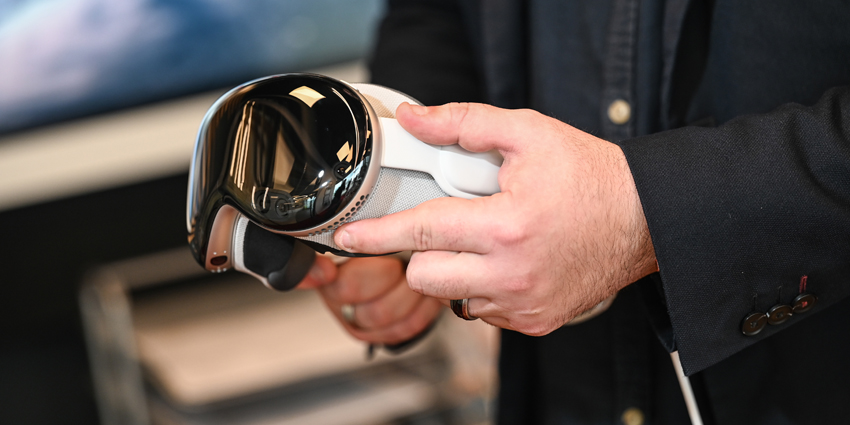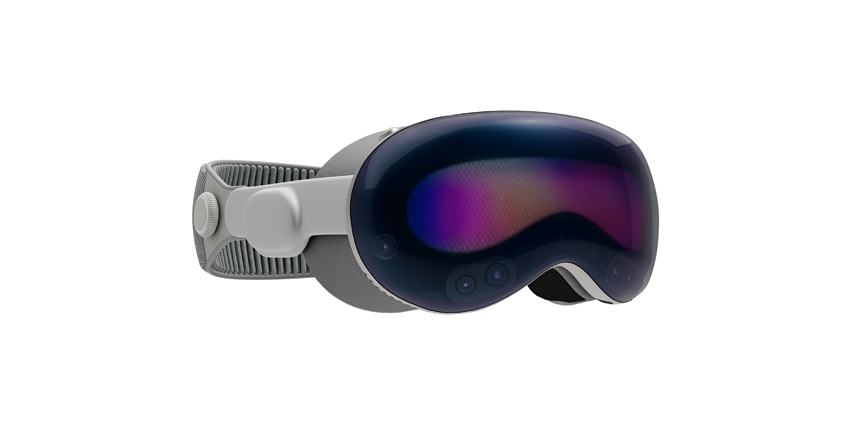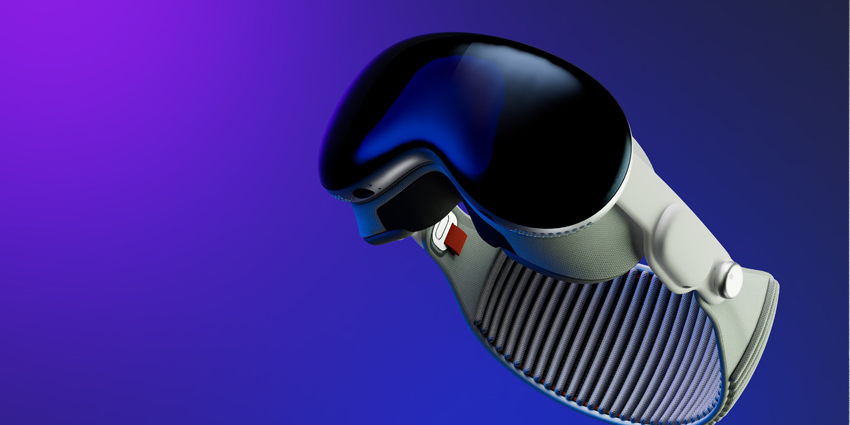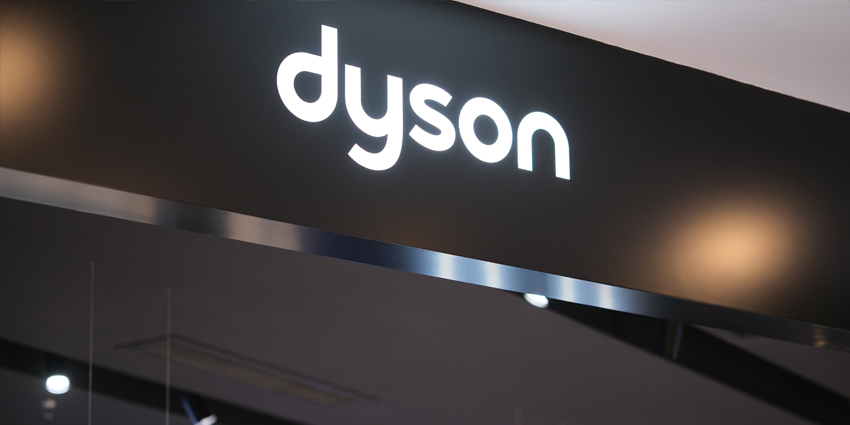Last week, at NYSE, Jon Li, Head of Sales at Xreal, a leading AR smart glasses company, acknowledged the transformative effects of AI across various enterprise sectors.
At the event, Jon Li said that AI has “really infiltrated everybody’s mindshare,” explaining that various enterprise end-users, from healthcare to security, can benefit from the emerging technology.
While the firm has not delivered an AI service via its hardware, including the recently released Air 2 Pro device, the comment may suggest Xreal’s interest in AI – which is not surprising considering the impact of genAI across every sector.
Moreover, speaking on Xreal hardware, Jon Li added:
We want to bring augmented reality to everybody, something everyone can afford. Because spatial computing is really the next evolution of computing and how we interact with data.
Xreal and AI
Despite a lack of AI on the Xreal portfolio, the firm has previously dealt with the emerging technology.
In March 2022, Xreal – then Nreal – partnered with Microsoft to conduct research on a medical AR device at the University of Bristol that leveraged AI to help blind children navigate a space.
The research led to the PeopleLens device, which used Xreal Light hardware and Microsoft software to scan and identify individuals around a blind and say that person’s name aloud.
Xreal’s and Microsoft’s PeopleLens leveraged an AI platform to track the wearer’s surroundings in real-time to create a “PeopleMap”, which digitizes a wearer’s surroundings and those occupying a space.
Microsoft researchers are using four state-of-the-art computer vision algorithms to understand the surroundings of a child with low vision, where the AI platform can locate, identify, track, and capture the eye-gaze of nearby peers.
The AI platform also stitches together a digital world map based on recorded real-world data, where the headset translates real-world data to the wearer via spatial audio notifications to create the PeopleMap.
From Nreal to Xreal: New Markets, Fresh Spatial Computing Competition
2023, for many XR firms, proved to be a transformative year for Xreal itself. Many immersive technology firms underwent an image change during 2023, including Meta and Microsoft, following the marketplace’s stumble in 2023. However, these leading firms flipped the year’s mainstream narrative for XR, building 2024 up as a landmark year for XR.
For Xreal, the company underwent a rebranding, which saw the firm change its original “Nreal” name following multi-year legal trouble with Epic Games, who took Xreal to court over the use of similarly titled services.
Epic alleged that the trademarks of the two companies, “Nreal” and “Unreal,” were visually similar and could cause confusion among customers. Additionally, Epic argued that both companies worked with the same technology partners, which could further increase the likelihood of confusion.
Xreal, on the other hand, claimed that its trademark was distinct and significantly different from Epic’s. Xreal also stated that their shared technology partners were sophisticated enough to recognize the dissimilarities between the two companies.
However, it appears that Xreal chose to take the name change following the court proceedings. However, the Chinese AR smart glasses manufacturer rebranded with a bang, creating a direct and affordable competitor to the Apple Vision Pro.
Notably, Xreal debuted Apple Macbook integration for its Nebula operating system (OS), significantly improving productivity opportunities for the firm’s product portfolio. The firm first introduced the Macbook service as a Beta in November 2022.
Nebula for Mac allows users to connect an Xreal product to their MacBook computer and stream immersive content of up to 102 inches in size on immersive screens. Integrating MacBook with Xreal brand immersive hardware enables Apple users to boost their productivity using virtual screens as second monitors – similar to Apple’s promises.
By operating a MacBook computer with Xreal Air devices, users can leverage the Nebula infrastructure to transform their MacBook into an AR-ready mobile workstation, similar to Apple’s recently unveiled spatial computing vision.
With the help of Xreal, users can access traditional workplace tools such as the Office Suite via their MacBook and stream the service on a virtual monitor at a resolution of 1920×1080 and a refresh rate of 60Hz. Moreover, users can stream media to the glasses’ virtual screen using applications like YouTube and Netflix.
Peng Jin, the Co-Founder at XREAL, added:
Wherever you are, at work or play, your MacBook just became one of the first computers to support enhanced AR and Spatial Computing. I believe that XREAL and Apple share the same vision of Spatial Computing and the enormous impact it will have on our lives. We have worked hard for several years to develop products like XREAL Beam, products that bring us closer to making Spatial Computing a reality
Following its beta release, Xreal’s Nebula OS comes with a collection of new features allowing MacBook users to get a spatial computing experience today – ahead of the Vision Pro’s pricey debut in 2024.
Moreover, Xreal is partnering with startup Sightful to develop Spacetop, a mobile spatial computing product that works alongside Xreal smart glasses.
The firm aims to support hybrid workers by allowing them to expand their workflows across various immersive screens. Sightful aims to reach the spatial computing shared “virtual external monitors” productivity use case that MR headset firms like Apple and Immersed also aim to lead in.
During AWE 2023, Sightful’s CEO Tamir Berliner explained that the firm is optimizing the solution’s hardware, software, and usability ahead of a general release expected to be delivered to prospective customers via an early access program for approximately $2000.
Xreal to Ship Landmark Sales Figures
As Xreal rebrands and aims to lead in the spatial computing space alongside mountainous competitors, the firm is documenting record sales figures and optimistic forecasts.
In July 2023, Xreal announced it would forecast 200,000 units shipped following a confirmed 150,000 shipments in May, a massive sales growth for the company.
At the time, the Co-Founder of Xreal Peng Jin remarked that the firm is experiencing large-scale sales growth – “it should not be the norm,” Jin noted. Moreover, Jin said, “it’s very encouraging that people are accepting this new form factor; they are accepting this new experience.”
Peng Jin also added:
We do see spatial computing as the major technological trend in the next maybe two, three decades. I don’t think the trick is in creating a whole bunch of original content so people can forget what they’re doing and evolve into that. For us, the content is already there.
Moreover, at AWE 2023, Xreal CEO and Co-Founder Chi Xu also spoke on Xreal’s record number of users, forecasting that Xreal devices will become the “first 100M AR killer use case,” adding that “AR will surpass VR in 5 years.”
With its forecasts of AR reaching record figures, Xreal would likely try to find a way to integrate both the large potential user bases of AI and AR to continue its journey as a leader in the spatial computing marketplace alongside steep competition.







